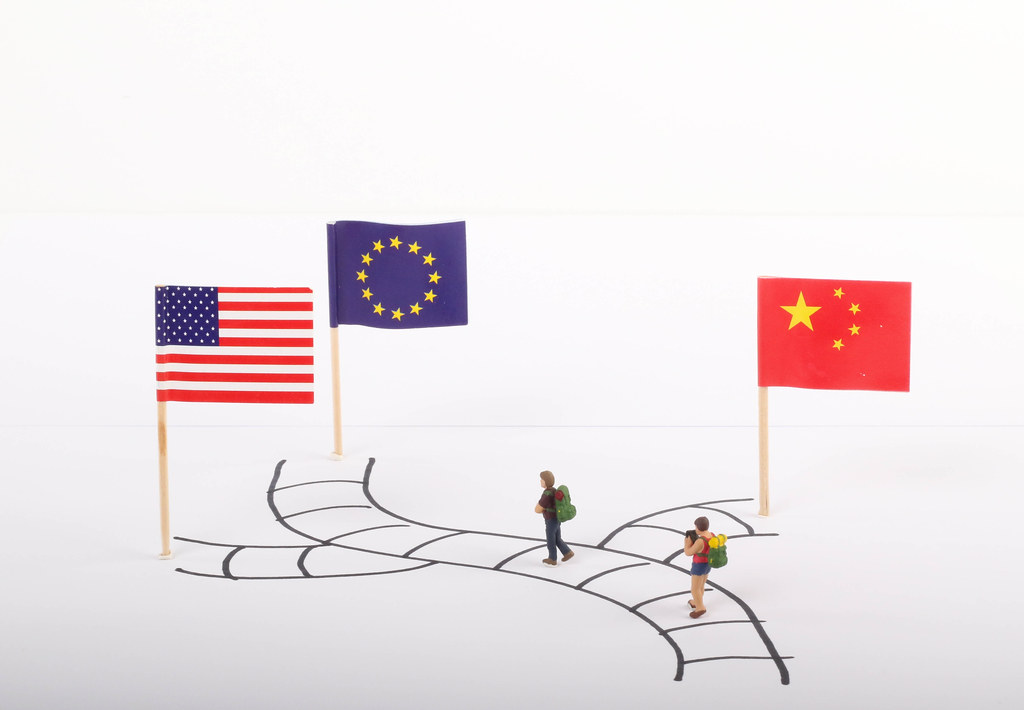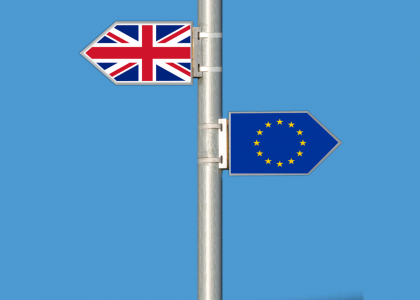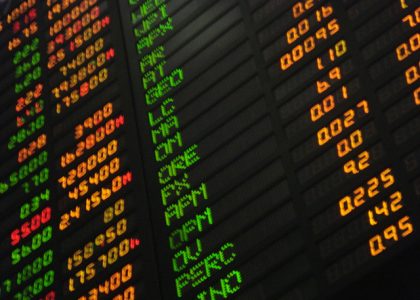A changing world order has affected the EU’s the economic relationship with the two powerhouses of the 21st century, the USA and China. This blogpost explores how. And argues that the EU is at the crossroads.
Superpower or powerless?
China’s rapid growth has challenged US hegemony and fuelled European fears of being side-lined in the new emerging world order. I assess the European Union’s economic relationship with the US and China and its ability to compete with them effectively. The EU has successfully used its ‘market power’ to exert international influence, but it is also facing new challenges. Looking at EU-US trade relations in the Trump era and beyond, the EU’s Investment partnership with China, and its response to the Belt and Road initiative, I argue that the European Union should strengthen its relationship with the US and focus on economic co-operation with China.
The Transatlantic trade relationship
Donald Trump’s presidency saw the US international approach take shape around the ‘America First’ motto and a relative disengagement from world affairs. Europe saw some glimpses of what a Western bloc without full American support may look like for the first time in over 70 years. Focusing on trade, it is important to consider both the short-term implications of the election of Donald Trump and the long-term prospects for EU-American relations.
Trump suspended ‘The Transatlantic Trade and Investment Partnership’ (TTIP), followed by the imposition of a series of tariffs on European aircraft and agriculture after the WTO concluded the EU had provided “illegal subsidies” in these areas. Europe imposed retaliatory tariffs, including aluminium and steel, whiskey and motorcycles. The consequences of these measures? Employment rates decrease in the affected sectors because of the rise in costs of importing or exporting goods, with the cost being passed on to consumers goods and exposing the US economy to trade retaliations. Furthermore, Trump’s imposition of tariffs without consulting or opportunities to negotiate was deemed hostile from Europe. The EU employed “rebalancing measures” against the US valued at $3.3 billion, targeting key products including aluminium, steel, and bourbon, demonstrating the successful use of its economic might.
Joe Biden’s election dawned new hope for improved economic cooperation with Europe. Recent negotiations to reduce Trump era measures under the Biden administration show a willingness to deescalate and cooperate. The next significant economic step for the two actors is to consider reopening negotiations on a free trade agreement. The initial negotiations on the TTIP were widely criticised by activist groups across member states, notably for their secrecy and lack of transparency. The state-investor dispute settlement mechanism was particularly controversial. The unwillingness of both sides to compromise on sensitive issues, such on food standards, led to a breakdown in negotiations. Although the negotiations may have failed, investment and trading between the two actors are significantly higher than between all other trade areas. US investment in the EU is three times higher than in all of Asia, and EU investment in the US is eight times more than in India and China taken together, so, it seems inevitable that the two actors who share half of the world’s GDP combined return to working on an economic partnership.
Chinese economic conquest
China is a vastly different geopolitical landscape from the United States due to cultural differences and different models of governance. As China’s economy grows, navigating between US “containment strategies” and Russian distrust, it has increasingly gravitated towards Europe to establish itself as more than a regional superpower. Chinese investment of $50 billion in infrastructure, energy, and telecommunications projects are currently underway or planned. The use of economic instruments and incentives has been central to China’s targeting of Europe. China has already extended its influence within the EU itself, for instance controlling the fourth major port in Europe. Piraeus, the Greek port operator, sold much of its share to Chinese-state backed COSCO.
The two sides are reinforcing their cooperation through the deal of December 2019 on the Comprehensive Agreement on Investment. This agreement is important for European businesses looking for joint ventures with Chinese companies, which are currently restricted. It would give greater access to investors in the auto, healthcare, cloud computing, air and maritime industries, among many other sectors. In return, China can solidify its position, particularly at a time of heavy American sanctions on imports and exports. China has also committed to greater market access for European companies and a fairer playing field including definition of rules for state-run organisations and subsidy transparency, as well as a sustainable development plan addressing forced labour. Enforcing commitments is more complex, relying on China to provide evidence that may not reflect truthful changes. There is no guarantee China will follow through with their commitments and no way for Europe to enforce the provisions.
China’s Belt and Road Initiative is a concern for Europe due to the terms of Chinese investments. They often come in loans, targeting countries that would not be conventionally eligible for such loans due to their weaker economic position – including Eastern Europe. The conditions of the loans are unfavourable when it comes to repayment, resulting in debt traps and increased dependence on China, providing it with political and financial influence on the domestic affairs of the debtors. The EU has recently announced its own Global Gateway scheme, designed to counter the Belt and Road Initiative. It is based on joint private and public sector investments with various grants and favourable soft-loan conditions. This plan officially aims to favour the development of poorer countries without them entering in extensive debt and preventing over-reliance on, and influence of China. The €300 billion ‘Global Gateway’ funding is dwarfed by the upwards of $1 trillion BRI loans, suggesting that Europe may be outcompeted, losing geopolitical influence.
In the EU concerns have grown about China’s investments and influence but member states are divided. Greece blocked an EU-wide statement calling on China to respect the “International Law of the Sea,” and a year later, it blocked an EU statement calling China to respect human rights. This may be an indication of how China’s economic investment in the region have bolstered its geopolitical influence.
At the crossroads: what is next for Europe?
The European market is one of the three main trade blocs in the world economy. It is the EU’s strongest tool to exert influence and promote European values. Europe has successfully countered American trade wars through retaliatory measures, an indication of its economic might. Yet, Europe still has reasons for concerns. Political tensions with the past US administration have caused rifts in the transatlantic relationship. Reviving trade negotiations may present an opportunity to solidify a well-established yet uncertain relationship, but an agreement must be mutually beneficial to succeed. With China, the EU oscillates between cooperation and competition. China’s growing prominence has led the EU to engage it and negotiate a newsworthy investment partnership. At the same time, the BRI has caused concerns within the EU, resulting in the development of a competitive project whose scale pales in comparison.
Moving forward, how can Europe compete with the ever-growing economic power of China? It will be difficult for the EU to match China’s economic output over the next decade, and although the current competitiveness of some products and services – such as engineering or pharmaceutical products – could be sustained with enough instruments, Europe will also need to look elsewhere to maintain competitive advantages.
A recent report released by the European think tank Bruegel on how Europe could strategically position itself suggested two potential alternative strategies for the EU:
- Multilateralism: Lobbying for the adaptation of World Trade Organisation (WTO) terms to incorporate China and then focus on reforming fair trade practices. The dominant role of State-Owned Enterprises (SOEs) in the Chinese economy makes it difficult for Western businesses to compete. Changes in WTO rules would attempt to minimise this and decrease governmental influence in the market.
- Closer ties with the US: Europe could follow the containment strategy of the United States, forming closer trade partnerships and moving away from Chinese imports. However, in the current political climate of declining US hegemony and glimmers of US withdrawal from the global stage to favour protectionism, this may not be a reliable option.
The EU could also choose a hybrid strategy and combine both approaches. However, the European Union faces two issues. The first is that China’s continual growth in market power may lead it to distance itself from the Western world economic order and from institutions like the WTO. This would make the embedding of China within WTO rules only a short-term strategy. The second issue relates to the weakening and unpredictable nature of American hegemony. Since the Biden administration came to power, the US reliability has improved. However, if American power continues to decline as a mirror of China’s growth, a sensible medium-term for the EU might be to contain China’s economic and political influence. The European Union will find it difficult to compete with China in a context of American and Western decline. Forming a closer relationship with China – potentially at the expense of the US relationship – in exchange for Chinese political or economic commitments may be the only long-term viable strategy for the EU.
Oscar Houseago is a second year International Relations and Politics student who joined UEA excited to learn about the intensifying international power struggle between hegemonic power and the role of international organisations.






Good job all around Oscar, I especially enjoyed your piece on The Transatlantic Trade relationship. Now that England is out of the E.U, do you believe England is in a better position to trade with the U.S in light of the U.S-E.U trade conflict? From an American perspective, it seems that England has more to gain with the U.S now that you have detached yourself from the E.U who has annoyed the U.S.
The U.S and Europe are starting to cooperate more in light of the Russian invasion of Ukraine but I fear this cooperation is going to be short lived and the quarrelling will ultimately resume between the E.U and U.S